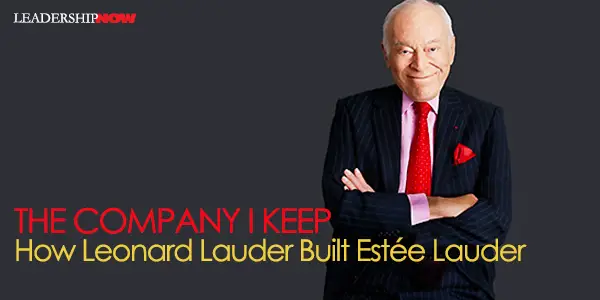 |
 |
12.11.20

The Company I Keep: How Leonard Lauder Built Estée Lauder
ESTÉE LAUDER founded what would become the Estée Lauder Corporation in 1933 on the conviction that “every woman can be beautiful.” Her ambition was to have a life filled with beautiful things, and that “rested entirely on her ability to sell her skincare products.” The first five chapters of The Company I Keep: My Life in Beauty are a must-read for any entrepreneur. Her son, Leonard, details the tenacity, business acumen, salesmanship, and mindset of a superstar businesswoman. Her Uncle John developed a face cream, and she began demonstrating it in high school. She wrote, “Deep inside, I knew I had found something that mattered much more than popularity. My future was being written in a jar of cream. My moment had come and I was not about to miss seizing it.” She pioneered the “sales technique of the century:” the free sample. No woman would ever leave empty-handed. Estée Lauder was built on the free sample.
My mother didn’t realize it at the time, but her insistence on personally training saleswomen would be a key differentiator when she eventually opened counters in department stores. Other brands used saleswomen to merely sell products; thanks to my mother’s training program, her salespeople taught customers how to use her products to look their best. Her hands-on approach—what her father had dismissed as “fiddling with other people’s faces” —was a charm. “Touch your customer and you’re halfway there,” she would preach. And she was a tenacious saleswoman even following New Yorkers who headed south to winter in Miami—staying for months. My mother stopped at nothing in order to inform every woman about her products so that she would tell more women. No one escaped. She stopped strangers on the street and on trains to give them beauty tips. She famously interrupted a Salvation Army sister’s bell-ringing to explain how she could make her skin look and feel fresher. “There’s no excuse for looking untidy,” she admonished. An acquaintance from those years remembered how my mother would approach someone she had never met before, evaluate her makeup, and proceed to tell her how to correct it. “She would end up selling her $40 worth of Cosmetics.” Leonard learned many lessons watching his mother, and his quest for excellence served him well during his time in the Navy. One of the greatest lessons he learned there was, “No matter how smart you think you are, there’s always someone who’s smarter. No matter how good you are, there’s always someone better. I would search out and hire exactly those people.” This belief, he says, would help play an enormous role in the growth Estée Lauder. And if he had to fire someone, he took responsibility. “Everyone has worth. The fact that we have no been able to take advantage of your skills is not your fault. It’s our fault.” He wanted to build Estée Lauder into the General Motors of the beauty business, “with multiple brands, multiple product lines, and multidimensional distribution.” The book is full of great lessons and the stories behind them. Here are some I pulled out. Positioning is the product. 
Posted by Michael McKinney at 02:12 PM
|
BUILD YOUR KNOWLEDGE
 

How to Do Your Start-Up Right STRAIGHT TALK FOR START-UPS 
Grow Your Leadership Skills NEW AND UPCOMING LEADERSHIP BOOKS 
Leadership Minute BITE-SIZE CONCEPTS YOU CAN CHEW ON 
Classic Leadership Books BOOKS TO READ BEFORE YOU LEAD |